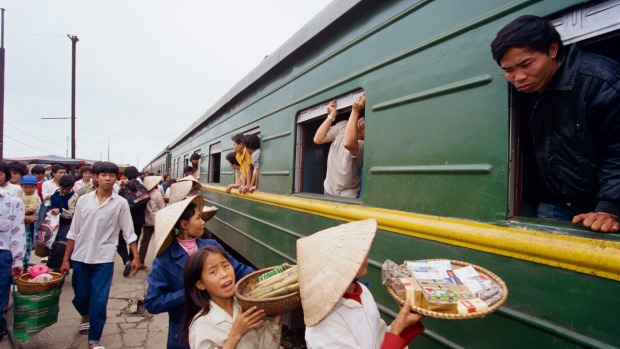
There's nothing quite like the chugga-chugga of a train to put kids to sleep.
Some of our favourite memories are from rail journeys through remote regions in the developing world. Inside my head, it goes like this: "OK, what's safer: a small plane, overnight train, or bus? All right, seems their safety record is pretty much the same. So, what's the cheapest?"
Trains are more likely to offer discounts for kids so – even for multi-generational travel – they come out on top. If it's overnight, you also save money on accommodation. Our most recent trip was from Hanoi to Hue: 14 hours on the Vietnam Railways System.
"Let's stock up on food before we get on board," our guide, Khoa, warned. "You could die if you eat in the dining car."
We shared the carriage with other intrepid families, several locals sleeping in the hallway, and staff members curled in the corner. Hubby burst out laughing when he saw the sleepers: at 1.9 metres, his torso was the length of the bed. (Really, you can't complain when others are sleeping on the floor.)
We gathered around our tiny table to play euchre by flashlight, picnicking on fruit, crackers and Wasabi peas. It was like camping, with the soporific motion of the train lulling us sleep.
Of course, there was the bone-jarring halt at each station but, hey, we survived. Frankly, I slept like the dead. "You're lucky, mum," Taj said in the morning. "I had to go to the toilet, and it smelled like the dead!"
Often, our best memories are forged while roughing it. How many of your childhood holiday memories are from a five-star hotel, or up the pointy end of a plane?
This echoes recent research, which has found most of us invest in a bank account, but only half see the value in banking memories. The research, by the website Stayz, reveals almost two-thirds of Australians would rather have "priceless" memories than a one-off payment of $5000.
"It's the episodic memory, the memory of things and events that happen to you that we need to invest in, as it allows us to positively reminisce and bring back the emotions and feelings created when first forming the memory," according to Dr Tim Sharp from the Happiness Institute. "This positive reminiscing unlocks the key to long-lasting happiness."
The length of the average holiday is getting shorter – down to 5.5 days – but this is apparently long enough to "encode" memories.
Studies in the journal Applied Research in the Quality of Life show the biggest boost in happiness comes from the simple act of planning a holiday. Dr Sharp says you should book in advance, as a family, to create anticipation.
"It's not about lavish, life-changing destinations, it's all about spending quality time together with loved ones away from the daily grind," says Amee Evans, from Stayz.
The kids were reminiscing about our Vietnam adventure the other day. We got around on cyclos, a mini-bus, boats, bikes, and the aforementioned train trip.
"Now THAT was an adventure," Grace said, shaking her head. "Sure, I thought we were going to die. But that's part of the fun, right?"
Yes, yes it is.